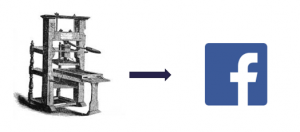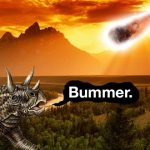
Engell and O’Donnell’s Cambridge Forum broadcast speaks on the gains & losses of technological transformations, its implications on literature and public values. O’Donnell refers to this as American “frontiers” creating a basis of civilizations to follow. His examples of gains & losses include the invention of the automobile and subsequently, parking tickets, increased speed and death tolls. This is a very similar argument to a more recent broadcast I came across at the beginning of my first term in J-school…
I recommend listening to an episode of the CBC’s The Current that features Chris Kutarna (Part 1 and Part 2), the Oxford scholar and political scientist who introduces his book, “The Age of Discovery: Navigating the Risks & Rewards of Our New Renaissance”. His argument was that while the 1st Renaissance brought us the Gutenberg printing press, new maps, the Ottoman Empire, the Protestant Reformation, and the microscope, we are now in a 2nd Renaissance. Today, we have computers, the Internet, China, Brexit, and now Trump’s infamous tweets.
Willinsky alludes to this as well: “whether the introduction of the Internet bears comparison with the revolution that Gutenberg initiated with his invention of moveable type and printer’s ink” (367). He’s a proponent of providing public access to educational research but it’s important to note that Willinsky, Engell and O’Donnell’s ideas came just a few years before the creation of Facebook where I think the social and linguistic implications are far more apparent along with other social media platforms.
Kutarna makes a good point about how advancements in digital technology actually “entangles” us rather than connects us. While we can choose to pick up a book and read it, things like pandemics, terrorism, and financial crises are not optional events. We have to make a conscious effort to literally “block” crazy friend requests and turn off push notifications.
The proliferation of the internet has made it possible to share information in a public forum yes, but whether this information is vetted or “tempered by an ethos of critique” (Willinsky, 375) is a utopian ideal. I don’t think the issue here is about the democratization of qualified information, but rather, easy access to any information. For example, I think most would rather look up how to cure a headache on WebMD than Google Scholar, for example. We can only trust our own judgement when it comes to the sea of information out there.
References
Engell, J. (Presenter) & O’Donnell, J. (Presenter). (1999). From Papyrus to Cyberspace [radio broadcast]. Retrieved from https://canvas.ubc.ca/courses/4290/files/609973/preview
Tremonti, Anna Maria. “Are we living in the age of the 2nd renaissance?” CBC, The Current. 7 September, 2016, http://www.cbc.ca/radio/thecurrent/the-current-for-september-7-2016-1.3750038/are-we-living-in-the-age-of-the-2nd-renaissance-part-2-1.3750232
Willinsky, J. (2002). Education and Democracy: The Missing Link May Be Ours. Harvard Educational Review, 72(3), 367-392.


Marcia
May 31, 2018 — 10:13 pm
Thank you for recommending the Chris Kutarna talk. I am not finished listening to it all yet but am enjoying it so far. It is interesting to think of all of these social media platforms as being part of a “Renaissance” but indeed it is all a part of a life-changing time that we are experiencing.
I find the idea of “entangling” rather than “connecting” to be very interesting. It seems to be a common theme, or rather fear, that all of these technological advancements are actually isolating us and pulling us further and further apart from one another. We may believe that these social media platforms are connecting us all together, but really aren’t we just staring at our screens rather than having face-to-face interactions and conversations? Is the idea of a community fading? Do any of us bother to get to know our neighbors anymore or do we simply not have time between work, home and catching up with our various apps?
Another idea you touched on that is very important is the access to any information. You are correct in that we need to use our judgment and really focus on teaching the younger generation about valuable and reliable information. Having so much access to all of this information is a very dangerous and frightening thing. Without the guidance, experience and sense that not all of it is true, it could be harmful to many. Any thoughts on how to explicitly teach these skills to young children?
Enjoyed reading your post!
Carri-Ann Scott
June 4, 2018 — 8:49 am
Hello, Cathy.
Your post raises some excellent points and I too am a fan of Anna-Maria Tremonti. The Current is often not only entertaining but enlightening.
Adding to the idea of entanglement, I look at the Internet as a mass of information waiting to become ‘knowledge’. In the Constructivism course I am taking, we are examining the idea that knowledge must be based on a true belief. If the ‘fact’ that you are consuming comes from the Internet, is it a solid basis on which for you to form a belief? Can you confirm it from multiple sources? The likely answer is yes, but as in all scholarly endeavours, we must make sure that the sources are credible. Is Fox News a credible source? What about the CBC? Is there anything to separates the two? Both have legions of followers who would declare that if it is reported by their preferred source it must be valid. No questions asked.
Taken further, I can find backers to support just about any claim I wish, and then further backers for those, making the quest for knowledge cyclical. To my own mind, my research is pure and valid, but your sources might differ completely and be equally valid in your mind.
Are we encouraging our students to make a conscious effort to look for the entangling effects? To further your point, what are we doing to teach vetting and validation skills to the next generation? Are we at risk of having a polarized society, based on the sources of information followed? Furthermore, if social media is becoming the most accessed ‘news source’, are we ready for everything from our job applications to our political views being examined, judged and vetted based on our online profiles (Greenwood, 2009)?
While I am confident in my ability to determine if I can use a remedy I find of WebMD vs FaceBook, am I equally confident that the next generation can make the same, informed decisions? And perhaps more importantly, what are the implications if they cannot?
References:
Brown, M. D. (2013). Vetting sources in social media environments: Strategies employed by journalists of the palm beach post (Order No. 1523409). Available from ProQuest Dissertations & Theses Global. (1418012577). Retrieved from http://ezproxy.library.ubc.ca/login?url=https://search-proquest-com.ezproxy.library.ubc.ca/docview/1418012577?accountid=14656
Greenwood, B. (2009, 09). Facebook: The next great vetting tool? Information Today, 26, 1-2,46. Retrieved from http://ezproxy.library.ubc.ca/login?url=https://search-proquest-com.ezproxy.library.ubc.ca/docview/214803043?accountid=14656
sally bourque
June 7, 2018 — 9:22 pm
Hi Cathy, Marcia, Carrie Ann,
Cathy – GREAT title!
I too like the idea of entangling rather than connecting. It’s an accurate description of the messiness and vastness of the web, with just a hint of danger.
Another dangerous aspect of social media and obtaining our news and other information from these platforms is the algorithms behind the content and who owns those. These sites create an illusion of control and access, but in reality, we are probably a lot more limited than we think. Remember when Google was the “ad free web browser”? Now I frequently find ads at the top of search results that appear almost identical to the actual results. Not to mention the politics and economics that inform which content is actually displayed and in what order.